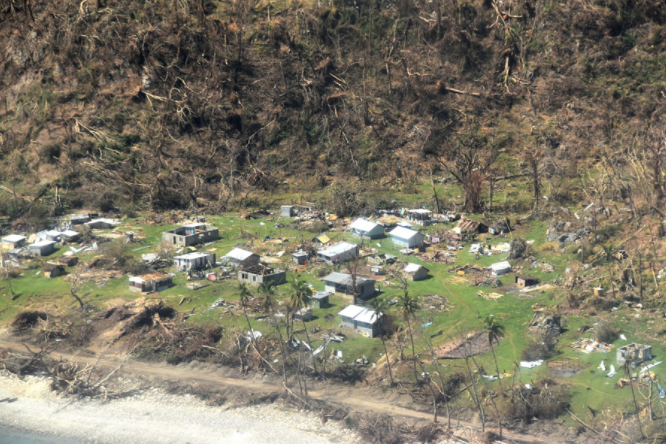In Vanuatu, the world’s most disaster-prone country, there is not yet an approved approach or plan to guide a sanitation and hygiene response after an emergency. The confluence of Cyclone Harold and a global pandemic in March 2020 saw the significant impact on Vanuatu when forced into a state of emergency. As an archipelago nation, it is home to 300,000 people who reside across some 83 islands, making any emergency response all the more challenging. Its low-lying coastal aspect in the tropical Pacific region makes Vanuatu one of the most vulnerable to the weather extremities caused by climate change. And, just like the rising sea levels, these weather events are on the increase.
An emergency response to support and safeguard water and sanitation demands a different set of considerations, and requires a different set of responses. The recent dual emergency of cyclone and pandemic highlighted a number of specific barriers that made the emergency response within Vanuatu all the more challenging. With humanitarian deployments limited and a COVID-19 lockdown prohibiting the arrival of aid workers and the international delivery of supplies, strong localised leadership was required.
The development of these emergency guidelines aims to address the more nuanced responses needed for these dynamic situations.
Pro bono partnering
EWB has partnered with Arup to support the development of these emergency sanitation and hygiene guidelines, led by Vanuatu’s Ministry of Health (MoH). This work is the next chapter in the development of the national hygiene and sanitation guidelines and standards which EWB has been working on with the MoH since 2018, with a rural Chapter added and approved by the MoH in early 2020.
The Arup pro bono team comprises five engineers – Naomi Joyce (Civil Engineer, project support), Melissa Truong (Civil Engineer, project support), Gabrielle McGill (Senior Engineer, international development advisory), Sian Harrick (Process Engineer, project management) and Daniel Lambert (Senior Engineer, project director). Based in Melbourne, the team is remotely supporting the project through assessing existing guidelines and responses, drafting emergency guidelines, and developing designs for sanitation units that can be deployed in an emergency.
EWB’s team based in Vanuatu is facilitating stakeholder engagement and liaison with the Vanuatu government, and also providing insights into sanitation design for challenging environments, and piloting some of the technologies where required.
Building on a solid knowledge base
This project is focusing on compiling consistent emergency sanitation guidelines, and the team has been able to draw heavily on the situational and traditional knowledge of several entities, as well as globally recognised standards that are already being utilised.
Key knowledge hubs include the Vanuatu Water, Sanitation and Hygiene (WASH) Cluster, which aims to ensure adequate, coherent and effective humanitarian outcomes by mobilising all stakeholders who are working for disaster management preparedness, response and recovery in the WASH sector; as well as the National Disaster Management Office, the Vanuatu government’s agency responsible for coordination of responses to emergencies and disasters across Vanuatu.
Resources that are already in use and which have fed into existing guidelines include the Red Cross Minimum standards for protection, gender & inclusion in emergencies; and the Sphere Handbook – one of the most widely known and internationally recognised sets of common principles (eg. WHO) and universal minimum standards in humanitarian response.
As part of the project, the team is conducting a planning and regulatory review, including interaction with the National Building Code, to ensure that the solutions that are recommended are compliant and support the Vanuatu Government’s policies, planning and regulations, thereby supporting the longer term objectives of the country.
It is also an opportunity to incorporate best practice around gender, protection and inclusion, and creating a more integrated approach to menstrual hygiene management.
Ensuring community context
Perennial challenges around the right type of technical skills and training to respond to emergencies within Vanuatu’s population remain. It means a key outcome of this project is to ensure that the infrastructure solutions that are developed, and the sanitation and hygiene practices recommended, can be built and implemented by Vanuatu’s local communities, with limited outside support. Easily sourced local building materials and locally available labour or pre-positioning of key components prior to any emergencies, will be critical to meeting this objective.
As for any project, community engagement is crucial to ensure that solutions are culturally appropriate, and are responsive to the various environments that are a feature of Vanuatu’s unique landscape.
Progress reflections
Sian Harrick of Arup (and project manager for this initiative) notes that the approach being taken is to work at the humanitarian/development nexus. The primary objective of the emergency sanitation response is to protect people from the most immediate threats to public health. Yet the project also provides an opportunity to harness the renewed focus on WASH and direct resources as a result of the emergency.
“There is an opportunity to increase the baseline level of sanitation – in places where the existing sanitation was below standard prior to the emergency – to an appropriate standard that will remain after an emergency. This ensures an improvement in the overall public health outcomes of communities. These however must be balanced against future cost and maintenance burdens to the community. If done appropriately, this will improve environmental and health outcomes beyond the emergency response period. It may also increase resilience for responding to future emergencies and reduce the impact of future natural hazards,” says Sian.
The project is well underway, and is expected to conclude mid 2021.
Featured image: A village damaged by Tropical Cyclone Harold on Pentecost Island. Credit: Australian High Commission, Port Vila.
EWB’s work in Vanuatu is supported by the Australian NGO Cooperation Program (ANCP) and generous donors. You can support our work as well by making a donation here.


